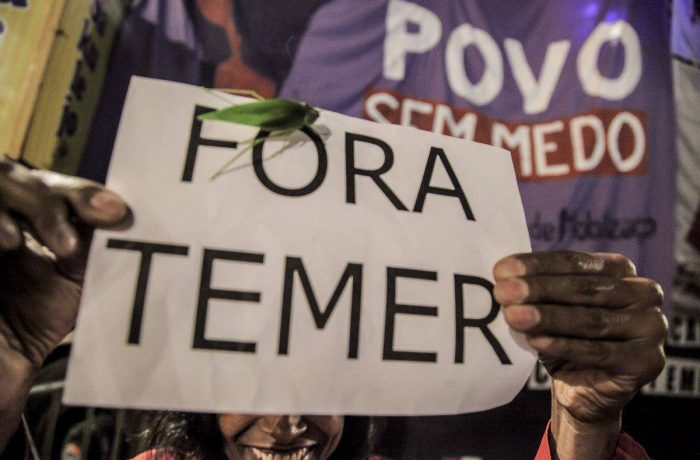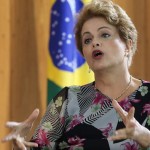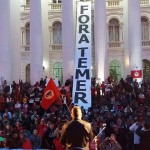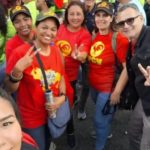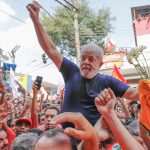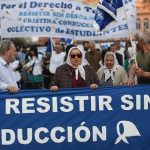NO TO THE INSTITUTIONAL PUSTCH – You could see it coming: The majority of the Senators decided to have Dilma Rousseff [5] impeached [6]. This hard blow was unconstitutional, however. It was based on no legal or judicial evidence.
The TEMER[1] project radicalises the social war
Note to the reader:
Since this article was written, and in the space of only one month, interim President Michel Temer has lost three Cabinet ministers! These had to resign when caught trying to obstruct police investigations into corruption at PETROBRAS (State oil Company).
Temer himself is under investigation; and a high judge has ruled that Congress should consider impeaching him too!
Street demonstrators regularly call for his resignation, and in one opinion poll, he scored 2%.
Dilma Rousseff is now calling for a referendum to have the country decide on fresh elections, instead of letting Temer continue to rule until 2018 – which he will be allowed to do, even if he is impeached. Editorial.
The next few paragraphs are extracts from Independencia Sulamericana, 6.5.2016:
“The economic programme of the Temer-dominated government means denationalisation and general precariousness for labour. This diabolical neo-liberal project is a war declaration against the workers, provoking increasing social tensions and political conflicts.
The suppression of the rights at work and the scrapping of long-established social conquests are said to come from lack of funds. This is accompanied by budget reductions in health and education. The health privatisations are demolishing one of the most integrated and advanced health systems in the world – it is the United Nations that say so.
New regulations between capital and labour are revoking rights that people won under Getulio Vargas[2]. We are told that this will develop Brazil’s internal market, increase consumption and stimulate industry – but the minimum wage is being suppressed and pensions are being re-adjusted according to the laws of the market. The result is a sharp decline in working class purchasing power, pensions and Social Security.
The funds at the National Development Bank (BNDES) were frozen, and now they are being diverted to the Treasury – supposedly to repay the interests on the debt. The immediate priority of this government is privatisation, starting with the PreSal oil fields[3] where concessions are already changing hands. The Caixa Economica Federal, the bank linked to big social investment, is being privatised.
Under vice-President Temer, the Banco do Brazil is being de-capitalised and must open-up to foreign investors. The BNDES[4] must hand over to private bankers the public resources which it collects, also by way of repaying the public debt.
Those steps are unconstitutional and politically explosive. […]” – From Independencia Sulamericana, 26.5.2016.
****************
DOWN WITH THIS INSTITUTIONAL PUTSCH! CREATE OPPORTUNITIES FROM THE CHALLENGE!
Editorial of the Journal REVOLUCAO SOCIALISTA, 15 May 2016.
On 12 May 2016, a parliamentary majority on the Senate’s “special commission” decided to start Dilma Rousseff’s[5] impeachment[6]. This hard blow was unconstitutional because based on no legal or judicial evidence.
The photo is that of Dilma Rousseff, elected President of Brazil in 2010, fighting against impeachment in May 2016.
A strong political plan moves these Senate people. They want ultra-liberalism and privatisations, and they will impose themselves even without justification. They are an anti-popular, reactionary and non-representative set of evil-doers very much in trouble with the law themselves.
Good or bad, Dilma Rousseff was elected on the programme to preserve and extend the social rights won by the people over the last twelve years. The jackals of the new government want to use every means to bring down the programmatic platform upon which she won the 2010 elections.
It remains that the putschists may be biting more than they can chew. Brazil in 2006 is not that of 1964, year of the military coup. Over the last years, the governments of the Workers Party, the PT, consolidated measures of social progress that granted some power to the popular masses. It should not be long before this becomes obvious.
Throughout the country, there are multiplying instances of resistance. Various popular organisations are implicated, but sectors of the middle class are involved too, having only partially believed the media’s lies. Temer has just arrived, but even middle class people are already giving him a headache.
Popular resistance in the streets is going to decide matters. An important and symbolic fact is that Dilma refuses to resign, and calls for struggle instead. She plans to dedicate to resistance the time of her suspension. This is quite unlike the historic leaders of Brazil generally known to have responded to a coup by resigning, going into exile or committing suicide. Dilma promises to fight; it is not clear how constitutionally she will do so, but her conduct his firm. She feels the support of the population; she is encouraged by it to go forward and challenge the putschists. It is important to note also that various progressive Latin American countries oppose this coup and support her.
It is necessary to appreciate Dilma’s determination. It makes it possible to envisage her return. Now is the time to review the errors – those of the left in particular. The rise of the Frente Brasil Popular (FBP)[7], and the debates inside the Workers Party (PT) should serve to re-learn the forgotten lessons of the past on how to go forward.
Combine democratic measures with transformative ones
The coming struggle must combine democratic and transformative popular projects. The taboos imposed by the capitalist-financial dictatorship must be broken. Down with the speculative interest rates! Finance must be created to develop the life of the population. The Treasury’s reserves must go to public investments. Re-nationalise the privatised State enterprises and let Petrobras serve the national interests. The strategic reserves in uranium and niobium must be nationalised. The BRICS alliance needs reinforcing, along with the process of Latin American unification. Let’s finish with poverty and reduce social inequality. Make the rich pay and have the country governed in the interests of the majority.
It must be concluded that illusions in parliamentary alliances and governmental coalitions have come in the way of progress. These illusions are clearly demonstrating their limits today. The policy of compromising at all costs in order to govern is putting an un-sufferable break on the class struggle. When it was first achieved, it looked like a feat performed by the PT, and by Lula himself. Then the anxiety grew to avoid confrontations “between Brazilians”, and now, the most reactionary and conservative elites have stepped forward to impose their war. They always used the media to do so; now they want this arrogant government to destroy the social conquests. It took two full years of their poison-spreading before the Federal Police Operation “Lava Jato”[8] started looking into their corruption and money-laundering in Petrobras[9].
Elevate the role of the workers in the Trade Unions and in the Workers’ Party (PT)
The sharpening class struggle demands the reinstatement of the role of the trade unions. The single trade union centre, the CUT, was quite right to boycott the meeting where the putschists wanted the Unions to take part in attacks on Social Security. The CUT leads many fights, but it must let the weight of the working class impose solutions, instead of using that weight to negotiate and conciliate with the governments. Today’s events bring to light the fact that “governability” is not eternal, and that its conquests are not irreversible. No doubt about it – what we see in Brazil is the ugly face of capitalism.
Everything that was won in the streets must be kept in that way, in the working class struggles, and in the popular movements. The CUT must return to its class roots. It must politicise the trade union movement, and discuss what sort of society we want. The CUT must accept responsibility in the fight to build another society, from the defence of national sovereignty to a deepening process of social transformations. This is where Brazil is at: it has reached this decisive historic moment.
Now is the hour of resistance:
Dilma Rousseff has no accounts to give to her putschist accusers. With the help of popular support, she may be able to reverse her suspension. She may even hold back the judges in the “Lava-Jato” Petrobras case. What she can no longer do, however, is to continue with the methods of the past, those of “governability”. Those methods have reached their sell-by date.
Time has come to put the interests of the working population above all else. These interests are those of the majority – the women, the young and the old, the millions who build the country! The principle of National Sovereignty must be held as supreme in the same way. The putsch violates it. It hands over to the multinationals the exploitation of the Pre-Sal oil reserves under the sea; and National sovereignty is violated by the announcement that Brazil is now breaking from the South American unity.
If Dilma Rousseff recovers the Presidency, it will only be with the support of the population. Then, what is to stop her creating a majority in Congress from the ranks of those who support her in the streets? What is to stop her forming popular organs of permanent mobilisation? She could decree the end of the media dictatorship! She could help organise the fight against the corrupt and corrupting traitors of the fatherland – owners of industry, judges and politicians financed by the most obscure international agencies. Why not inaugurate a new Republic, more open, more democratic, more progressive – united to the BRICS, to the union of the South American nations (UNASUR) and to the community of the Latino American and Caribbean states (CELAC)? This would soon consign the putschists to the bin of history.
The struggle is in the streets, and it continues in the still standing institutions. A front of the left is needed to set-out a Nation’s Project that shakes off all the neoliberal and social ambiguities!
Today is only a start! Forward with ‘resistance and project’!
Editorial of the Journal REVOLUCAO SOCIALISTA, 15 May 2016.
[1] Michel Temer is a Brazilian lawyer. He was the running mate of Dilma Rousseff in the 2010 general elections which Dilma won. He became Vice President in January 2011; and on 12 May 2016, he assumed presidential powers as Acting President after Dilma Rousseff was impeached. He will be Acting President for some 180 days. If the Senate decides to remove Dilma from Presidency at that point, Temer will be become President until the end of Dilma’s mandate, a further 2 years.
[2] Getulio Vargas, Brazilian Nationalist President from 1930 to 1945, and from 1951 until his death by suicide in 1954. Brought to power by the Armed Forces in the Revolution of 1930. Transformed Brazil from a plantation-based economy into an industrialised one. Created State monopolies in oil production (Petrobras), State mining, State steelmaking, State car industry, etc. The tendency to de-nationalisation started in the 1990’s under Collar de Mello and F H Cardoso.
[3] The Pre-Salt Oil layer is 2kms below a salt layer also 2km deep under the sea. This area, on the continental shelves, was discovered in recent years. These geological deposits are said to be 570 to 510 million years old.
[4] BNDES is a Federal Public Company associated with the Ministry of Development, Trade and Industry. It considers it its duty to take account of ethical and environmental principles.
[5] Dilma Rousseff, born 1947, became 36th President of Brazil in 2010. Before that date, she was Chief of Staff of President Lula, from 2005 to 2010. Daughter of a Bulgarian immigrant. Was a leftwing guerrilla in the years following the 1964 military coup. She was captured and tortured between 1970 and 1972.
[6] This procedure has not ended. It is subject to a trial likely to last for some five months.
[7] FBP is the Frente Brazil Popular, created Oct 2015, formed against privatizations, particularly of Petrobras. It contains the Trade Union Centre CUT, the MST (landless movement), the oil workers’ Union, as well as national organisations of Women, Students and Youth.
[8] Lava Jato – ‘Operation Car Wash’ in English – is an investigation being carried out by the Federal Police of Brazil; it started with the discovery of bribes between the top leaders of the Petrobras company; further scrutiny led police to the discovery of massive fraud and plundering of the company’s assets. Although Dilma Rousseff is not accused of having taken part in this, she was President when the corruption is supposed to have started, and she is now accused of having manipulated figures to hide the extend of the country’s deficit. She denies this.
[9] Petrobras: one of the biggest oil companies in the world, set up by Vargas under State control. Following Cardoso’s attempts at the privatisation of Petrobras (in the 1990’s) and Lula’s re-nationalisations, the Brazilian State has kept a majority state in Petrobras.
